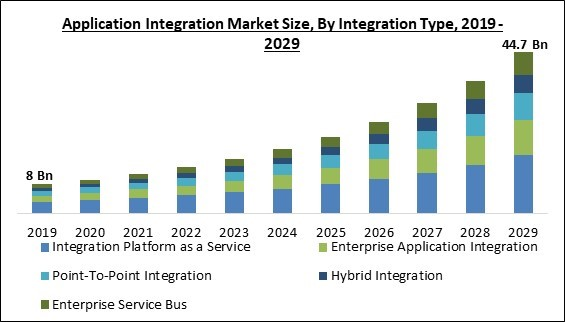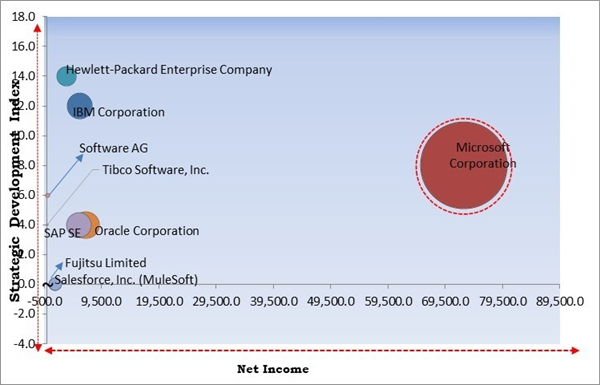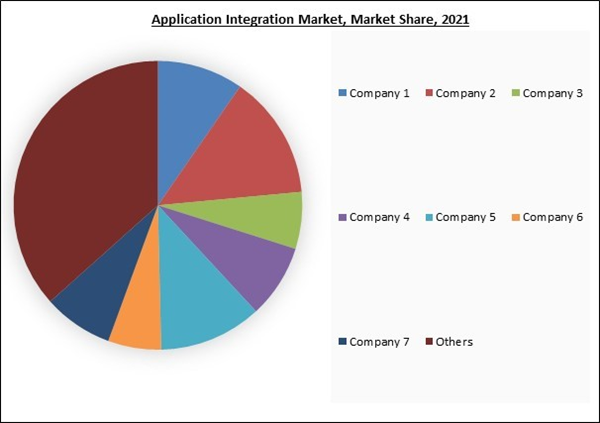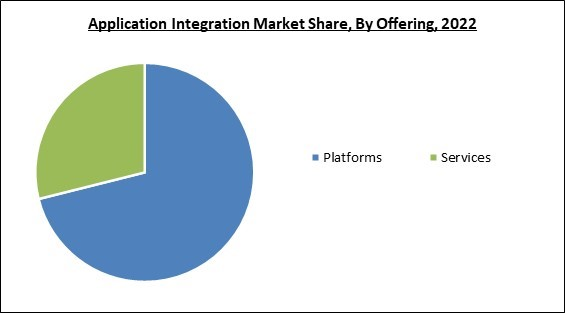Point-to-point integration is one of the major integration types of the market and businesses are adopting this type of integration because it can be a cost-effective solution, especially for small to medium-sized organizations with limited integration requirements. Hence, it captured $2,057.4 million revenue in the market in 2022. Each connection the user makes is intended to help them with a specific business issue. It eliminates the need for investing in expensive integration middleware or platforms, reducing both upfront and ongoing costs.
Moreover, application integration is a beneficial application for Human resources, as it can help to streamline HR processes by eliminating manual data entry and reducing the number of disparate systems that HR professionals have to navigate. Integrating HR applications can help to increase efficiency by automating routine tasks and allowing HR professionals to focus on more strategic initiatives. Thereby, the Human Resources Management System is anticipated to generate approximately 1/5thshare of the market by 2029.
The major strategies followed by the market participants are Partnerships as the key developmental strategy to keep pace with the changing demands of end users. For instance, In April, 2023, Oracle joined hands with Zoom and focuses on expanding access to virtual care, and delivering streamlined telehealth services, through integrating Oracle Cerner Millennium and Zoom. Additionally, Hewlett Packard Enterprise (HPE) came into partnership with VAST Data in April, 2023, to handle unstructured data in a more efficient manner.
The Cardinal Matrix - Market Competition Analysis
Based on the Analysis presented in the The Cardinal Matrix; Microsoft Corporation is the forerunner in the Market. In April, 2023, Microsoft extended its collaboration with Epic Systems, a US-based developer of healthcare software. The collaboration involves designing and integrating generative AI into healthcare by uniting Azure's OpenAi service 1 and Epic's electronic health record software. Through this collaboration agreement, the companies intend to support providers in delivering noteworthy business and clinical results. Companies such as Hewlett-Packard Enterprise Company, IBM Corporation, and Oracle Corporation Amazon.com, Inc. Samsung Electronics Co., Ltd., Sony Corporation are some of the key innovators in Market.
Market Growth Factors
Growing need to break down data silos and boost productivity
A data silo is a group of data that is inaccessible to all levels of a company's structure. Data silos are a costly and time-consuming issue for businesses. They must therefore be resolved. Application integration services enable effective data utilization by removing data silos and the costs that go along with them. In addition, cost-cutting initiatives may encourage businesses to use their data more to obtain a competitive advantage, improve operational efficiencies, and create new business prospects. Access to information throughout the entire company is essential in achieving this. Therefore, the demand is anticipated to increase as a result, which in turn, is accelerating the growth of the market.Rising focus on digital transformation throughout industries
Digital evolution is a non-linear process that transitions between phases of quick change and slower consolidation dependent on external and internal needs. To maintain pace throughout this transformation, however, the adaptability of digital operations is essential. Most firms have made direct or indirect investments in B2B connectivity driven by Electronic Data Interchange (EDI). In a similar vein, a lot of people have invested in application integration. As more businesses adopt digital transformation strategies, businesses are expected to continuously adapt their practices to increase productivity, quality, and customer satisfaction. Therefore, as the pace of digitalization increases, it will propel the demand.Market Restraining Factors
High cost of investments and availability of open-source software
The two main alternatives for integrating enterprise applications are open-source and proprietary software. However, applying application integration could be expensive and a long-term strategic decision. An API Manager, an ESB, a portal, and a data management platform are just a few integration platform stack solutions businesses may need to purchase. The recent growth of cloud computing coincides with the advent of open-source groups and approaches for developing new technology. Therefore, the market growth is anticipated to be hampered by such elements.The leading players in the market are competing with diverse innovative offerings to remain competitive in the market. The above illustration shows the percentage of revenue shared by some of the leading companies in the market. The leading players of the market are adopting various strategies in order to cater demand coming from the different industries. The key developmental strategies in the market are Partnerships & Collaborations.
Vertical Outlook
Based on vertical, the market is segmented into BFSI, retail & eCommerce, manufacturing, healthcare & life sciences, energy & utilities, automotive, transportation & logistics, government & public sector, and others. The retail and eCommerce segment procured a considerable growth rate in the market in 2022. Application integration can help businesses provide a better customer experience by enabling them to offer personalized and seamless interactions across different channels.Offering Outlook
Based on offering, the market is characterized into platforms and services. The platforms segment garnered the highest revenue share in the market in 2022. Integration platforms can help ensure that data is accurately and consistently integrated across different systems. This has the potential to increase the quality of the data that is utilized in decision-making while also reducing the number of errors. Integration platforms can provide organizations with greater visibility into their data and processes.Integration Type Outlook
On the basis of integration type, the market is classified into point-to-point integration, enterprise application integration, enterprise service bus, integration platform as a service, and hybrid integration. The integration platform as a service segment witnessed the maximum revenue share in the market in 2022. Building and deploying connections between on-premise and cloud apps and data is made possible by iPaaS. It doesn't require installing or administering any hardware or middleware and instead takes an API-led approach.Application Outlook
By application, the market is divided into customer relationship management, enterprise resource planning, human resource management system, supply chain management & business intelligence, electronic health record management, and others. The customer relationship management segment recorded a substantial revenue share in the market in 2022. By integrating various applications within a CRM system, customer data can be consolidated, providing a comprehensive view of customer interactions and preferences. This can help organizations tailor their offerings and improve the overall customer experience.Regional Outlook
Region wise, the market is analyzed across North America, Europe, Asia Pacific, and LAMEA. The North America segment witnessed the maximum revenue share in the market in 2022. The market is dominated by the US. The diversification of services offered and the shift from SaaS to cloud-based services for platforms and infrastructure are two factors influencing the widespread use of application integration in this region.The market research report covers the analysis of key stake holders of the market. Key companies profiled in the report include Fujitsu Limited, Hewlett-Packard Enterprise Company, IBM Corporation, Microsoft Corporation, Salesforce, Inc. (MuleSoft), Oracle Corporation, SAP SE, Software AG, Tibco Software, Inc. (Vista Equity Partners) and Itransition Group.
Strategies Deployed in the Market
Partnerships, Collaborations and Agreements:
- Apr-2023: Hewlett Packard Enterprise (HPE) came into partnership with VAST Data, a US-based developer of data platforms. The partnership involves integrating VAST's file software platform with HPE's GreenLake. This integration enables corporate clients to handle unstructured data in a more efficient manner.
- Apr-2023: Oracle joined hands with Zoom, a US-based provider of communication software. The collaboration focuses on expanding access to virtual care, and delivering streamlined telehealth services, through integrating Oracle Cerner Millennium and Zoom.
- Apr-2023: Microsoft extended its collaboration with Epic Systems, a US-based developer of healthcare software. The collaboration involves designing and integrating generative AI into healthcare by uniting Azure's OpenAi service 1 and Epic's electronic health record software. Through this collaboration agreement, the companies intend to support providers in delivering noteworthy business and clinical results.
- Mar-2023: Microsoft collaborated with Cognizant, a US-based provider of IT services. The collaboration involves introducing Microsoft cloud-based technology solutions to the healthcare market and working on the development of an integration roadmap between Microsoft Cloud and Cognizant's TriZetto healthcare products intended for the healthcare industry.
- Feb-2023: IBM came into collaboration with Juniper Networks, a US-based networking hardware company. The collaboration focuses on integrating IBM's network automation with Juniper's RAN optimization and Open RAN technology.
- Nov-2022: SAP collaborated with Schneider Electric, a France-based provider of electrical equipment. The collaboration involves accelerating industrial digitalization through shopfloor OT/IT integration. The collaboration with Schneider Electric reflects the software company's support for the Industry 4.0 ecosystem.
- Jul-2022: Oracle partnered with Microsoft, a US-based technology corporation. The partnership focuses on providing Azure customers to get direct and smooth access to Oracle databases on Oracle Cloud Infrastructure (OCI).
- May-2022: SAP SE teamed up with Google Cloud, a suite of cloud computing services. The collaboration focuses on introducing new integrations between SAP's ERP, SAP S/4HANA cloud, and Google Workspace. This integration benefits the users, allowing them to connect SAP software with the collaborative capabilities of Google Sheets and Docs.
- Feb-2022: Microsoft came into partnership with Teradata, a US-based provider of analytic data products and related services. The partnership involves integrating Microsoft Azure with Teradat's Vantage data platform. This integration supports teams across various professions and industries to make better and more informed decisions based on data.
- Feb-2021: IBM entered into a partnership with Palantir Technologies, a software company, that specializes in big data analytics. Through this partnership, the company aimed to help organizations put AI to work and become data-driven in every part of their operations.
- Jan-2021: Microsoft extended its partnership with SAP, a Germany-based software company. The extended partnership focuses on integrating Microsoft Teams and SAP's intelligent solutions. This integration enables companies to support organizations in making the best use of the cloud to rapidly adapt and innovate.
Acquisitions and Mergers:
- Mar-2023: Hewlett Packard Enterprise signed an agreement to take over OpsRamp, a US-based developer of the operations management platform. This acquisition would support clients in dealing with sophisticated multi-vendor IT systems and further enables them to manage IT investments in an efficient way.
- Mar-2023: Hewlett Packard Enterprise agreed to acquire Axis Security, a provider of cloud security. The addition of Axis Security expands the acquiring company's cloud security capabilities and further enables the company to cater to the evolving demand for integrated security and networking solutions.
- Jan-2023: Hewlett Packard Enterprise completed the acquisition of Pachyderm, a US-based operator of data engineering platform. The acquiring company intends to integrate Pachyderm's software with its supercomputing and AI solutions. The integrated solution advances a customer's journey from POC to production and equips the client with maximum efficiency and reduced costs.
- Jul-2022: IBM took over Databand, a leader in data observability software. Through this acquisition, the company intends to strengthen its software portfolio through automation, data, and AI to address the full spectrum of observability.
- Feb-2022: IBM completed the acquisition of Neudesic, a foremost U.S. cloud services consultancy. This acquisition would significantly expand IBM's offering of hybrid multi-cloud services and further enhance the company's hybrid cloud and AI strategy. Moreover, Neudesic brings deep Azure data engineering, cloud, and data analytics expertise to boost customers' hybrid cloud journeys.
- Feb-2022: Software AG took over StreamSets, a US-based developer of data integration platform. The addition of StreamSets technology perfectly complements the acquiring company's hybrid integration offerings, and further expands Software AG's market presence in the North American region.
- Jan-2021: TIBCO completed the acquisition of Information Builders, a US-based developer of business intelligence and integration software. This acquisition equips the acquiring company with a comprehensive suite of analytics and technology, thereby significantly enhancing its potential to support organizations in deciphering data problems.
Scope of the Study
By Integration Type
- Integration Platform as a Service
- Enterprise Application Integration
- Point-To-Point Integration
- Hybrid Integration
- Enterprise Service Bus
By Application
- Enterprise Resource Planning
- Customer Relationship Management
- Human Resource Management System
- Supply Chain Management & Business Intelligence
- Electronic Health Record Management & Others
By Offering
- Platforms
- Services
By Vertical
- BFSI
- Retail & eCommerce
- Manufacturing
- Healthcare & Life Sciences
- Energy & Utilities
- Automotive
- Transportation & Logistics
- Government & Public Sector
- Others
By Geography
- North America
- US
- Canada
- Mexico
- Rest of North America
- Europe
- Germany
- UK
- France
- Russia
- Spain
- Italy
- Rest of Europe
- Asia Pacific
- China
- Japan
- India
- South Korea
- Singapore
- Malaysia
- Rest of Asia Pacific
- LAMEA
- Brazil
- Argentina
- UAE
- Saudi Arabia
- South Africa
- Nigeria
- Rest of LAMEA
Key Market Players
List of Companies Profiled in the Report:
- Fujitsu Limited
- Hewlett-Packard Enterprise Company
- IBM Corporation
- Microsoft Corporation
- Salesforce, Inc. (MuleSoft)
- Oracle Corporation
- SAP SE
- Software AG
- Tibco Software, Inc. (Vista Equity Partners)
- Itransition Group
Unique Offerings
- Exhaustive coverage
- The highest number of Market tables and figures
- Subscription-based model available
- Guaranteed best price
- Assured post sales research support with 10% customization free
Table of Contents
Companies Mentioned
- Fujitsu Limited
- Hewlett-Packard Enterprise Company
- IBM Corporation
- Microsoft Corporation
- Salesforce, Inc. (MuleSoft)
- Oracle Corporation
- SAP SE
- Software AG
- Tibco Software, Inc. (Vista Equity Partners)
- Itransition Group












